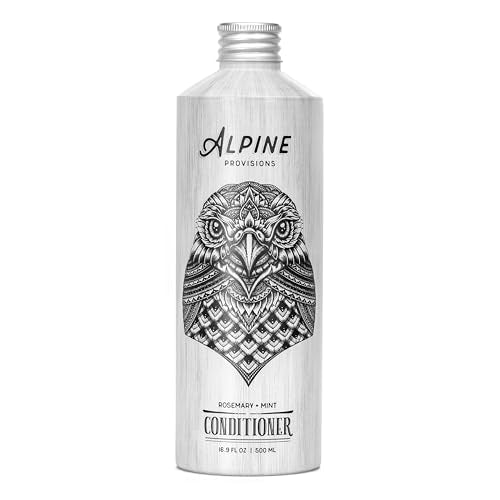
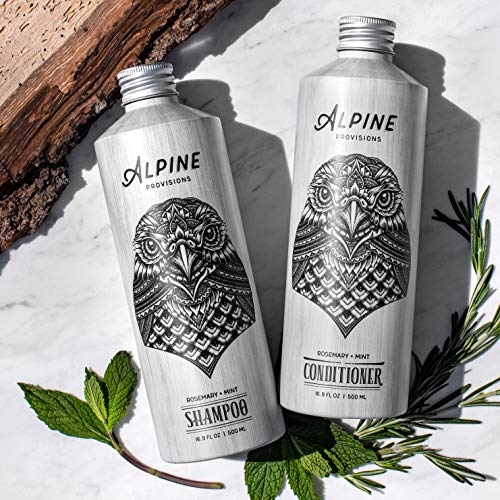
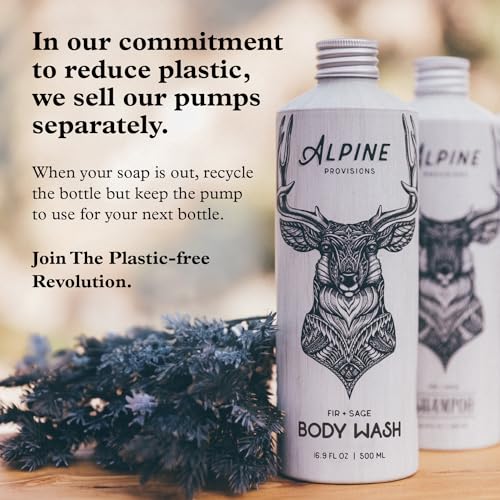
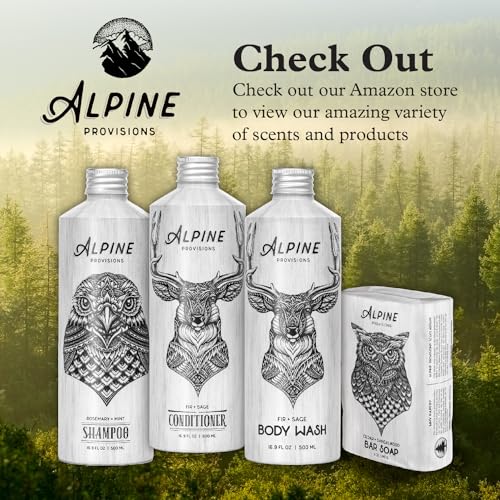
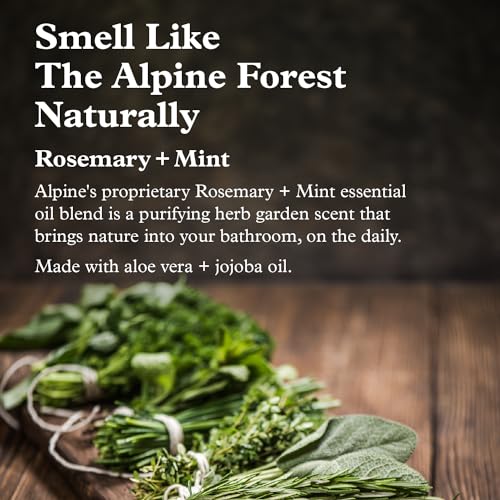

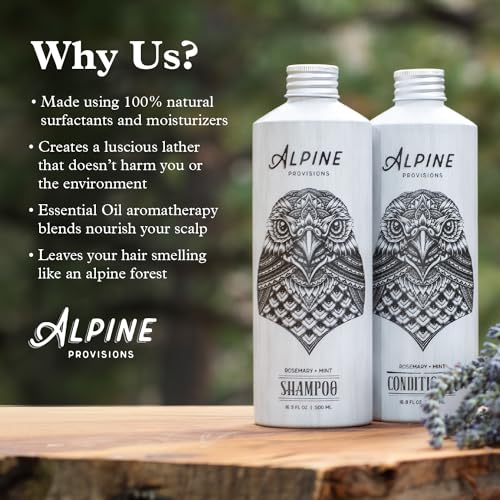
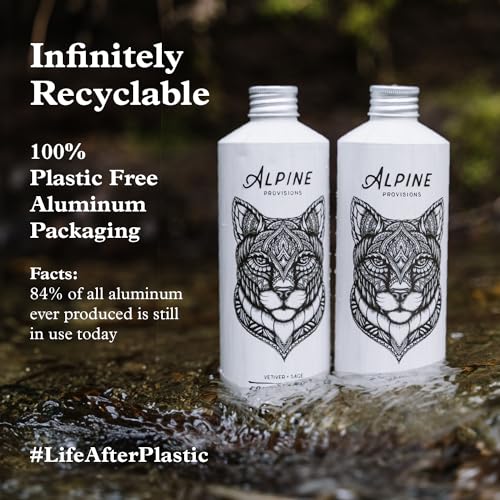
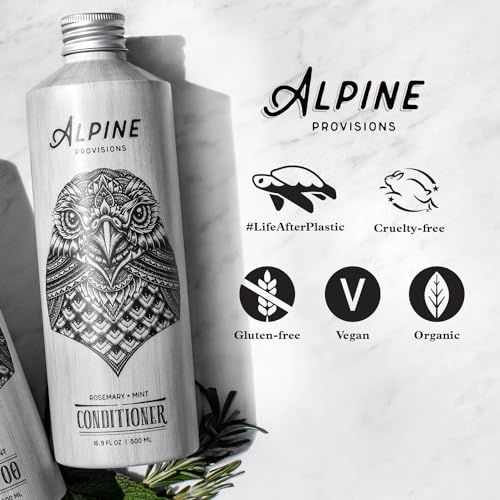
Alpine Provisions Rosemary & Mint Conditioner - Hydrate & Strengthen with Natural Oils - 16.9 FL Oz


Picea Mariana Leaf Oil
High RiskPicea mariana leaf oil, derived from the needles of the black spruce tree, is commonly used in personal care products for its aromatic properties and potential skin benefits. It functions primarily as a fragrance component and may also have preservative qualities due to its natural antimicrobial properties.
Sustai Insights
Picea mariana leaf oil offers functional benefits as a natural fragrance and potential antimicrobial agent, which can enhance product stability. However, it carries high usage restrictions and is associated with low risk for carcinogenicity, allergies, and reproductive toxicity. Environmental concerns include potential pollution and bioaccumulation. Regulatory warnings indicate heightened caution in use. Overall, the ingredient presents a high risk assessment, and users are advised to consider safer alternatives or limit exposure.
Behentrimonium Chloride
High RiskBehentrimonium chloride is a quaternary ammonium compound primarily used as a conditioning agent in hair and skin care products. It functions as an emulsifier and surfactant, helping to improve texture and manageability of hair.
Sustai Insights
Behentrimonium chloride offers functional benefits as a hair conditioner and emulsifier. However, it is associated with moderate allergenic potential and has high use restrictions due to regulatory concerns. It poses low risks for carcinogenicity and developmental toxicity but has been noted for neurotoxicity. Environmental risks include potential pollution and low biodegradability. Overall, the ingredient is assessed as high risk, and users should consider alternatives such as natural conditioners.
Sodium Benzoate
Medium RiskSodium benzoate is a preservative commonly used in food and cosmetic products to prevent microbial growth and extend shelf life. It is derived from benzoic acid and is effective at low concentrations, often used in acidic environments like beverages and condiments.
Sustai Insights
Sodium benzoate serves effectively as a preservative, contributing to product stability and safety. It is generally recognized as safe with low concerns for carcinogenicity, allergies, and reproductive toxicity, though it faces moderate use restrictions in some regions. Environmental risks include its potential as a pollutant, but it does not bioaccumulate significantly. Regulatory bodies have issued advisories regarding its concentration in products. Overall, the risk level is assessed as medium, with safe usage practices recommended. Alternatives such as potassium sorbate may provide similar benefits with potentially lower restrictions.
Rosmarinus Officinalis (Rosemary) Leaf Oil
Medium RiskRosmarinus officinalis (rosemary) leaf oil is extracted from the leaves of the rosemary plant. It is commonly used in cosmetic and personal care products for its aromatic properties and potential preservative benefits due to its antioxidant content.
Sustai Insights
Rosemary leaf oil offers functional benefits such as antimicrobial and antioxidant properties, which can enhance product stability. It is derived from a renewable source and is biodegradable. However, it presents moderate risks of allergic reactions and skin irritation, particularly with enhanced skin absorption. Regulatory bodies have noted restrictions on its usage in specific concentrations. The overall risk level is assessed as medium. Users are advised to follow safe usage practices and may consider alternatives like tocopherols or other natural preservatives.
Panthenol, D
Low RiskPanthenol, also known as provitamin B5, is a humectant commonly used in cosmetic and personal care products. It functions primarily as a moisturizer, enhancing skin hydration and improving the appearance of hair by imparting shine and softness.
Sustai Insights
Panthenol is effective in retaining moisture, thus providing functional benefits for skin and hair care products. It is generally recognized as safe, with low concerns regarding carcinogenicity, allergies, and developmental toxicity. However, potential cumulative exposure from multiple sources exists. Environmental risks are minimal, and it is not bioaccumulative. Regulatory bodies have not issued significant warnings; therefore, the overall risk level is assessed as low. For optimal use, it is recommended to follow product guidelines, and alternatives such as glycerin may also be considered for moisturizing effects.
Melaleuca Alternifolia (Tea Tree)
Low RiskMelaleuca alternifolia, commonly known as tea tree, is an unspecified preparation derived from the leaves of the tea tree. It is primarily used for its antiseptic properties and is found in various personal care products.
Sustai Insights
Tea tree oil offers functional benefits such as antimicrobial properties, making it effective in skincare formulations. It is considered to have low health risks, including low concerns for carcinogenicity, allergies, and reproductive toxicity. Environmental risks are minimal, with no significant pollutant or bioaccumulation potential. Regulatory bodies have noted no major advisories, and overall risk assessment remains low. For safe usage, it is recommended to use appropriate concentrations and consider alternatives like lavender or eucalyptus oil for similar benefits.
Helianthus Annuus (Sunflower) Seed
Low RiskHelianthus annuus (sunflower) seed is derived from the seeds of the sunflower plant and is commonly used in various cosmetic and personal care products. It serves primarily as an emollient and skin conditioning agent, providing moisture and enhancing the texture of formulations.
Sustai Insights
Helianthus annuus (sunflower) seed offers functional benefits, including skin conditioning and moisturizing properties, while being sustainably sourced and biodegradable. Health risks are minimal, with low concerns for carcinogenicity, allergies, and reproductive toxicity. Environmentally, it presents low risks of pollution or bioaccumulation. Regulatory assessments indicate no current restrictions. Overall, it is considered a low-risk ingredient, and safe usage practices should be maintained. Alternative ingredients may include other plant-based oils, but the sunflower seed oil remains a viable option.
Stearyl Alcohol
Low RiskStearyl alcohol is a compound produced from the hydrogenation of stearic acid, commonly used in cosmetic formulations as an emulsifier and thickening agent. It helps stabilize products by blending oil and water phases, enhancing texture and consistency.
Sustai Insights
Stearyl alcohol provides functional benefits as an emulsifier and stabilizer, contributing to improved product texture. It is generally regarded as safe with low concerns for cancer, allergies, and reproductive toxicity. However, it may cause moderate skin, eye, or respiratory irritation. Regulatory bodies do not impose significant restrictions, indicating a low overall risk. While it poses minimal health and environmental hazards, caution is advised for sensitive individuals. Alternatives like cetyl alcohol or plant-based emulsifiers may offer safer options for formulators.
Vegetarian Glycerin
Low RiskVegetarian glycerin, also known as glycerol, is a colorless, odorless, and viscous liquid derived from plant sources. It is primarily used as a humectant, solvent, and emollient in various personal care products, helping to retain moisture and improve texture.
Sustai Insights
Vegetarian glycerin offers functional benefits as an effective humectant, promoting hydration and skin smoothness. It is biodegradable and typically sustainably sourced. Health risks associated with glycerin are low, with no significant concerns for carcinogenicity, allergens, or reproductive toxicity. Environmental risks are minimal, and it is not subject to major regulatory warnings. Overall, the risk level for this ingredient is low, making it a safe choice in formulations. Safe usage practices include ensuring proper concentrations in products, and alternatives such as propylene glycol exist but may have differing properties.
Cetyl Alcohol
Low RiskCetyl alcohol is a long-chain organic alcohol commonly used in cosmetic formulations. It serves as an emollient, emulsifier, and thickening agent, enhancing the texture and stability of products. Cetyl alcohol is derived from natural sources, such as coconut or palm oil, and is often included in creams, lotions, and hair conditioners.
Sustai Insights
Cetyl alcohol offers functional benefits as an emollient and emulsifier, improving product texture and stability. It is biodegradable and sourced from renewable materials, contributing to sustainability. Health risks are minimal, with low concerns for carcinogenicity, allergies, or reproductive toxicity. Environmental impact is also low, with no significant pollutant or bioaccumulation potential. Regulatory bodies have not placed restrictions on its use, indicating a favorable safety profile. Overall, cetyl alcohol is assessed as low risk, and safe usage practices include ensuring proper formulation concentrations.
Ethylhexylglycerin
Low RiskEthylhexylglycerin is a glyceryl ether utilized primarily as a skin-conditioning agent and preservative in cosmetic formulations. It enhances the efficacy of preservatives and serves as a humectant, helping to retain moisture in the skin. This ingredient is commonly found in various personal care products.
Sustai Insights
Ethylhexylglycerin offers functional benefits as an effective preservative and skin-conditioning agent, contributing to product longevity and moisture retention. Health risks are generally low, with minor concerns regarding allergic contact dermatitis and irritant potential. Environmentally, it poses minimal risks, not being recognized as a pollutant or bioaccumulative. Regulatory bodies have imposed few restrictions, indicating its safety for use. Overall, its risk level is assessed as low, making it a viable option in cosmetic formulations. For those seeking alternatives, ingredients like propanediol may serve similar functions with potentially lower irritation profiles.
Caprylic Triglyceride
Low RiskCaprylic triglyceride is an ester derived from coconut oil and glycerin, commonly used in cosmetic formulations as an emollient, stabilizer, and skin-conditioning agent. It helps to improve the texture and spreadability of products while providing a lightweight, non-greasy feel.
Sustai Insights
Caprylic triglyceride offers functional benefits such as enhanced skin moisturization and improved formulation stability. It is generally regarded as safe, with low concerns regarding carcinogenicity, allergenic potential, and reproductive toxicity. Environmental impact is minimal, with no significant pollutant or bioaccumulative properties identified. Regulatory bodies have not issued warnings or restrictions. Overall, the risk level is low, making it a suitable ingredient in cosmetic products. Safe usage practices include adhering to recommended concentrations, and while there are alternatives, caprylic triglyceride remains a reliable choice.
Sodium Pca
Low RiskSodium PCA is a derivative of naturally occurring amino acids and is primarily used in cosmetics for its moisturizing properties. It acts as a humectant, attracting and retaining moisture in the skin, thereby enhancing hydration and improving skin texture.
Sustai Insights
Sodium PCA offers functional benefits as an effective humectant, enhancing skin moisture levels. It is derived from natural sources, supporting sustainable practices. Health risks are low, with minimal concerns regarding carcinogenicity, allergies, or reproductive toxicity. Environmental risks are also low, as it is not known to be bioaccumulative or a significant pollutant. Regulatory bodies have not placed significant restrictions on its use. Overall, it presents a low risk profile, making it a suitable ingredient in cosmetic formulations. Alternatives may include other humectants like glycerin or hyaluronic acid.
Picea Mariana Leaf Oil
High RiskPicea mariana leaf oil, derived from the needles of the black spruce tree, is commonly used in personal care products for its aromatic properties and potential skin benefits. It functions primarily as a fragrance component and may also have preservative qualities due to its natural antimicrobial properties.
Sustai Insights
Picea mariana leaf oil offers functional benefits as a natural fragrance and potential antimicrobial agent, which can enhance product stability. However, it carries high usage restrictions and is associated with low risk for carcinogenicity, allergies, and reproductive toxicity. Environmental concerns include potential pollution and bioaccumulation. Regulatory warnings indicate heightened caution in use. Overall, the ingredient presents a high risk assessment, and users are advised to consider safer alternatives or limit exposure.
Panthenol, D
Low RiskPanthenol, also known as provitamin B5, is a humectant commonly used in cosmetic and personal care products. It functions primarily as a moisturizer, enhancing skin hydration and improving the appearance of hair by imparting shine and softness.
Sustai Insights
Panthenol is effective in retaining moisture, thus providing functional benefits for skin and hair care products. It is generally recognized as safe, with low concerns regarding carcinogenicity, allergies, and developmental toxicity. However, potential cumulative exposure from multiple sources exists. Environmental risks are minimal, and it is not bioaccumulative. Regulatory bodies have not issued significant warnings; therefore, the overall risk level is assessed as low. For optimal use, it is recommended to follow product guidelines, and alternatives such as glycerin may also be considered for moisturizing effects.
Melaleuca Alternifolia (Tea Tree)
Low RiskMelaleuca alternifolia, commonly known as tea tree, is an unspecified preparation derived from the leaves of the tea tree. It is primarily used for its antiseptic properties and is found in various personal care products.
Sustai Insights
Tea tree oil offers functional benefits such as antimicrobial properties, making it effective in skincare formulations. It is considered to have low health risks, including low concerns for carcinogenicity, allergies, and reproductive toxicity. Environmental risks are minimal, with no significant pollutant or bioaccumulation potential. Regulatory bodies have noted no major advisories, and overall risk assessment remains low. For safe usage, it is recommended to use appropriate concentrations and consider alternatives like lavender or eucalyptus oil for similar benefits.
Helianthus Annuus (Sunflower) Seed
Low RiskHelianthus annuus (sunflower) seed is derived from the seeds of the sunflower plant and is commonly used in various cosmetic and personal care products. It serves primarily as an emollient and skin conditioning agent, providing moisture and enhancing the texture of formulations.
Sustai Insights
Helianthus annuus (sunflower) seed offers functional benefits, including skin conditioning and moisturizing properties, while being sustainably sourced and biodegradable. Health risks are minimal, with low concerns for carcinogenicity, allergies, and reproductive toxicity. Environmentally, it presents low risks of pollution or bioaccumulation. Regulatory assessments indicate no current restrictions. Overall, it is considered a low-risk ingredient, and safe usage practices should be maintained. Alternative ingredients may include other plant-based oils, but the sunflower seed oil remains a viable option.
Stearyl Alcohol
Low RiskStearyl alcohol is a compound produced from the hydrogenation of stearic acid, commonly used in cosmetic formulations as an emulsifier and thickening agent. It helps stabilize products by blending oil and water phases, enhancing texture and consistency.
Sustai Insights
Stearyl alcohol provides functional benefits as an emulsifier and stabilizer, contributing to improved product texture. It is generally regarded as safe with low concerns for cancer, allergies, and reproductive toxicity. However, it may cause moderate skin, eye, or respiratory irritation. Regulatory bodies do not impose significant restrictions, indicating a low overall risk. While it poses minimal health and environmental hazards, caution is advised for sensitive individuals. Alternatives like cetyl alcohol or plant-based emulsifiers may offer safer options for formulators.
Vegetarian Glycerin
Low RiskVegetarian glycerin, also known as glycerol, is a colorless, odorless, and viscous liquid derived from plant sources. It is primarily used as a humectant, solvent, and emollient in various personal care products, helping to retain moisture and improve texture.
Sustai Insights
Vegetarian glycerin offers functional benefits as an effective humectant, promoting hydration and skin smoothness. It is biodegradable and typically sustainably sourced. Health risks associated with glycerin are low, with no significant concerns for carcinogenicity, allergens, or reproductive toxicity. Environmental risks are minimal, and it is not subject to major regulatory warnings. Overall, the risk level for this ingredient is low, making it a safe choice in formulations. Safe usage practices include ensuring proper concentrations in products, and alternatives such as propylene glycol exist but may have differing properties.
Sodium Benzoate
Medium RiskSodium benzoate is a preservative commonly used in food and cosmetic products to prevent microbial growth and extend shelf life. It is derived from benzoic acid and is effective at low concentrations, often used in acidic environments like beverages and condiments.
Sustai Insights
Sodium benzoate serves effectively as a preservative, contributing to product stability and safety. It is generally recognized as safe with low concerns for carcinogenicity, allergies, and reproductive toxicity, though it faces moderate use restrictions in some regions. Environmental risks include its potential as a pollutant, but it does not bioaccumulate significantly. Regulatory bodies have issued advisories regarding its concentration in products. Overall, the risk level is assessed as medium, with safe usage practices recommended. Alternatives such as potassium sorbate may provide similar benefits with potentially lower restrictions.
Rosmarinus Officinalis (Rosemary) Leaf Oil
Medium RiskRosmarinus officinalis (rosemary) leaf oil is extracted from the leaves of the rosemary plant. It is commonly used in cosmetic and personal care products for its aromatic properties and potential preservative benefits due to its antioxidant content.
Sustai Insights
Rosemary leaf oil offers functional benefits such as antimicrobial and antioxidant properties, which can enhance product stability. It is derived from a renewable source and is biodegradable. However, it presents moderate risks of allergic reactions and skin irritation, particularly with enhanced skin absorption. Regulatory bodies have noted restrictions on its usage in specific concentrations. The overall risk level is assessed as medium. Users are advised to follow safe usage practices and may consider alternatives like tocopherols or other natural preservatives.
Behentrimonium Chloride
High RiskBehentrimonium chloride is a quaternary ammonium compound primarily used as a conditioning agent in hair and skin care products. It functions as an emulsifier and surfactant, helping to improve texture and manageability of hair.
Sustai Insights
Behentrimonium chloride offers functional benefits as a hair conditioner and emulsifier. However, it is associated with moderate allergenic potential and has high use restrictions due to regulatory concerns. It poses low risks for carcinogenicity and developmental toxicity but has been noted for neurotoxicity. Environmental risks include potential pollution and low biodegradability. Overall, the ingredient is assessed as high risk, and users should consider alternatives such as natural conditioners.
Cetyl Alcohol
Low RiskCetyl alcohol is a long-chain organic alcohol commonly used in cosmetic formulations. It serves as an emollient, emulsifier, and thickening agent, enhancing the texture and stability of products. Cetyl alcohol is derived from natural sources, such as coconut or palm oil, and is often included in creams, lotions, and hair conditioners.
Sustai Insights
Cetyl alcohol offers functional benefits as an emollient and emulsifier, improving product texture and stability. It is biodegradable and sourced from renewable materials, contributing to sustainability. Health risks are minimal, with low concerns for carcinogenicity, allergies, or reproductive toxicity. Environmental impact is also low, with no significant pollutant or bioaccumulation potential. Regulatory bodies have not placed restrictions on its use, indicating a favorable safety profile. Overall, cetyl alcohol is assessed as low risk, and safe usage practices include ensuring proper formulation concentrations.
Ethylhexylglycerin
Low RiskEthylhexylglycerin is a glyceryl ether utilized primarily as a skin-conditioning agent and preservative in cosmetic formulations. It enhances the efficacy of preservatives and serves as a humectant, helping to retain moisture in the skin. This ingredient is commonly found in various personal care products.
Sustai Insights
Ethylhexylglycerin offers functional benefits as an effective preservative and skin-conditioning agent, contributing to product longevity and moisture retention. Health risks are generally low, with minor concerns regarding allergic contact dermatitis and irritant potential. Environmentally, it poses minimal risks, not being recognized as a pollutant or bioaccumulative. Regulatory bodies have imposed few restrictions, indicating its safety for use. Overall, its risk level is assessed as low, making it a viable option in cosmetic formulations. For those seeking alternatives, ingredients like propanediol may serve similar functions with potentially lower irritation profiles.
Caprylic Triglyceride
Low RiskCaprylic triglyceride is an ester derived from coconut oil and glycerin, commonly used in cosmetic formulations as an emollient, stabilizer, and skin-conditioning agent. It helps to improve the texture and spreadability of products while providing a lightweight, non-greasy feel.
Sustai Insights
Caprylic triglyceride offers functional benefits such as enhanced skin moisturization and improved formulation stability. It is generally regarded as safe, with low concerns regarding carcinogenicity, allergenic potential, and reproductive toxicity. Environmental impact is minimal, with no significant pollutant or bioaccumulative properties identified. Regulatory bodies have not issued warnings or restrictions. Overall, the risk level is low, making it a suitable ingredient in cosmetic products. Safe usage practices include adhering to recommended concentrations, and while there are alternatives, caprylic triglyceride remains a reliable choice.
Sodium Pca
Low RiskSodium PCA is a derivative of naturally occurring amino acids and is primarily used in cosmetics for its moisturizing properties. It acts as a humectant, attracting and retaining moisture in the skin, thereby enhancing hydration and improving skin texture.
Sustai Insights
Sodium PCA offers functional benefits as an effective humectant, enhancing skin moisture levels. It is derived from natural sources, supporting sustainable practices. Health risks are low, with minimal concerns regarding carcinogenicity, allergies, or reproductive toxicity. Environmental risks are also low, as it is not known to be bioaccumulative or a significant pollutant. Regulatory bodies have not placed significant restrictions on its use. Overall, it presents a low risk profile, making it a suitable ingredient in cosmetic formulations. Alternatives may include other humectants like glycerin or hyaluronic acid.
Experience the rejuvenating power of Alpine Provisions Rosemary & Mint Conditioner, a plant-based hair care solution designed to naturally moisturize, repair, and strengthen your hair. Infused with organic essential oils, this 16.9 FL Oz conditioner offers a refreshing blend of Black Spruce, Bergamot, Patchouli, Rosemary, and Mint, ensuring a delightful scent while promoting healthy hair.
- Natural Hydration: Enriched with Aloe and Sunflower Seed Oil, this conditioner provides deep hydration and protection, leaving your hair soft and manageable.
- Nourishing Formula: Formulated with 100% natural ingredients, it nourishes and strengthens hair, promoting a balanced and vibrant look.
- Eco-Friendly Packaging: Join the plastic-free revolution by purchasing pumps separately, allowing for easy recycling of the bottle after use.
- Social Impact: With every purchase, 1% goes to the Colorado Outward Bound School Scholarship Fund, supporting community leaders through outdoor experiences.
- Vegan & Gluten-Free: Made without sulfates and harmful chemicals, this conditioner is a safe choice for health-conscious consumers.
Elevate your hair care routine with Alpine Provisions for healthier, happier hair.
Subscribe & Save with Sustai
- Best Price Guarantee: Always enjoy the lowest prices on sustainable home essentials.
- No Surprises: We’ll notify you before shipping. No hidden fees, ever.
- You’re in Charge: Change, pause, or cancel your subscription anytime with ease.
- Eco-Friendly Deliveries: Our grouped shipments mean less packaging and lower emissions.
Join us on a sustainable journey. Special offers for a limited time! Prices and promotions may change.
Recommended Products
Experience the rejuvenating power of Alpine Provisions Rosemary & Mint Conditioner, a plant-based hair care solution designed to naturally moisturize, repair, and strengthen your hair. Infused with organic essential oils, this 16.9 FL Oz conditioner offers a refreshing blend of Black Spruce, Bergamot, Patchouli, Rosemary, and Mint, ensuring a delightful scent while promoting healthy hair.
- Natural Hydration: Enriched with Aloe and Sunflower Seed Oil, this conditioner provides deep hydration and protection, leaving your hair soft and manageable.
- Nourishing Formula: Formulated with 100% natural ingredients, it nourishes and strengthens hair, promoting a balanced and vibrant look.
- Eco-Friendly Packaging: Join the plastic-free revolution by purchasing pumps separately, allowing for easy recycling of the bottle after use.
- Social Impact: With every purchase, 1% goes to the Colorado Outward Bound School Scholarship Fund, supporting community leaders through outdoor experiences.
- Vegan & Gluten-Free: Made without sulfates and harmful chemicals, this conditioner is a safe choice for health-conscious consumers.
Elevate your hair care routine with Alpine Provisions for healthier, happier hair.

You can have at most 2 Sustainable Steals products in your cart
Customer Reviews
Customers’ View
Customers appreciate the effectiveness and eco-friendly nature of the Alpine Provisions Conditioner, noting its ability to hydrate and nourish hair while being gentle on color-treated strands. Many users highlight the pleasant, earthy scent, reminiscent of outdoor experiences, which leaves hair looking shiny and healthy. They commend the product's natural ingredients, emphasizing its vegan and plant-based formulation. The aluminum packaging is also well-received, as it aligns with sustainable practices by reducing plastic waste. However, some customers find the conditioner too thick, making it difficult to dispense. Overall, this product is viewed positively for its quality and commitment to both hair health and environmental responsibility.
AI-generated from the text of customer reviewsThis product is rated 4.5 of 5.0 stars.
It has received 2 reviews.




